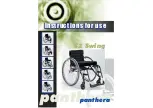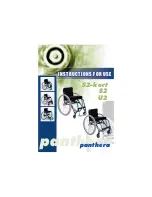
31
REA® ASSIST
We recommend that you have the chair tested by the qualifi ed person who has prescribed the wheelchair, after
he or she has made the adjustments that you request, taking your build and needs into account. We hope that
you have also received help in learning how best to use the wheelchair. Start by practising carefully until you are
familiar with the wheelchair’s possibilities and limitations.
Safety instructions/propelling techniques
Move to/from the wheelchair
Propel the wheelchair as near as possible to the seat that you want to
move to. Apply the brake. Remove the armrests or move them upwards
out of the way, and detach the legrests or swing them outwards. Do
not support yourself on the footplates as this may cause the chair to
tip forwards.
Stretching and leaning
Propel the wheelchair as near as possible. When stretching and bending,
do always have full contact between the backrest and the back otherwise
the wheelchair may tip over. Stretching behind the back is not recom-
mended.
Propelling up a slope
Many experienced users can propel themselves up a slope. In order not
to lose control of the steering and to avoid tipping backwards, you should
always lean forwards whilst propelling up a slope. Propel the wheelchair
forwards using short, quick strokes applied to the hand rims, in order
to maintain speed and steering control.
Generally, help is needed on steep slopes.
If you have to stop on a slope, it is particularly important to ensure that
you do not make any sudden or unexpected backward movements when
you start moving the wheelchair forwards again. As the wheelchair is
already leaning backwards, such a movement may cause the wheelchair
to tip backwards. The maximum gradient of slopes that can be attempted
is varied between 3° and 13,5° depending on the user weight and the
adjustments of the wheelchairs.
Propelling down a slope
We recommend that you obtain the help of one or more assistants
when going down steep and wet slopes.
First check the slope to see if there are any particular hazards, potholes,
slippery sections, etc. Never use the user-operated brake to slow down.
When you apply the brake on a downward slope, the wheels lock and
the wheelchair can suddenly pull to one side, tip sideways or stop
immediately, which may cause you to be thrown out of the chair. Always
control the speed with the hand rims. Remember that the hand rims
may become hot due to friction, and this may cause injury to your hands.
Try to propel down the slope in a straight line as much as possible.
Summary of Contents for Rea Assist
Page 1: ...Rea Assist Manual English...





































